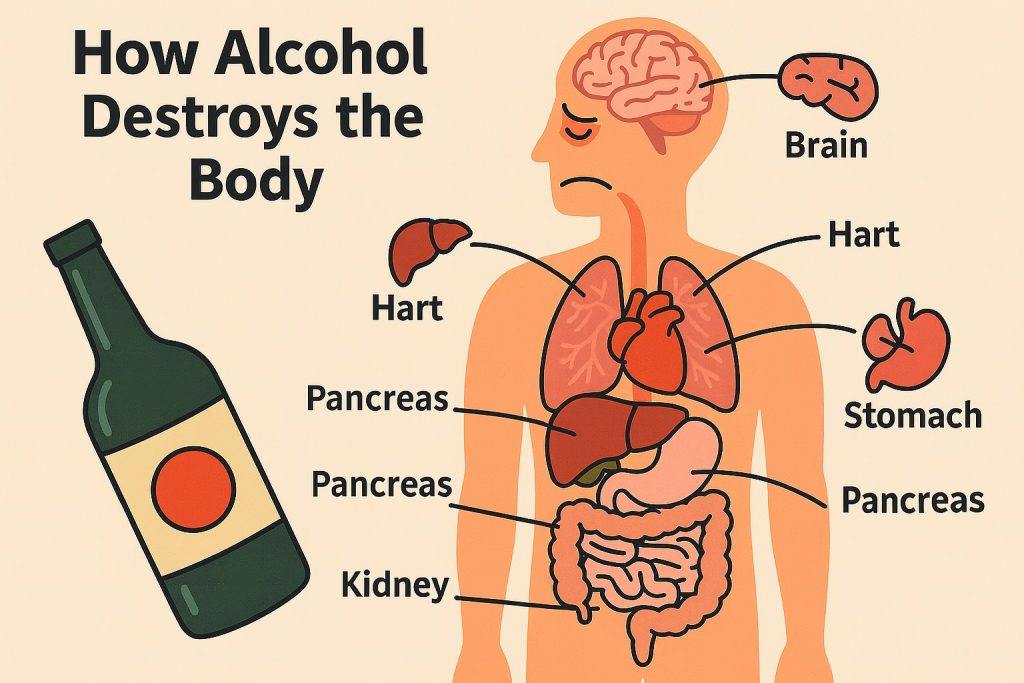Alcohol, specifically ethanol, is a central nervous system depressant that can cause both short-term intoxication and long-term damage. While small amounts may have a temporary relaxing effect, chronic or heavy consumption affects nearly every organ system in the body. The damage often develops silently, with symptoms appearing only after years of use.
The Liver: First Line of Defense and the First to Suffer
The liver is responsible for breaking down alcohol, but the process generates toxic byproducts like acetaldehyde, a known carcinogen. Repeated exposure causes:
- Fatty liver (steatosis) — a buildup of fat in liver cells
- Alcoholic hepatitis — liver inflammation
- Fibrosis and cirrhosis — permanent scarring that impairs liver function
Cirrhosis can eventually lead to liver failure, requiring transplantation.
Brain and Nervous System: Cognitive Decline and Dependency
Alcohol disrupts neurotransmitter balance, impairing coordination, memory, and judgment. Long-term abuse can cause:
- Brain shrinkage, especially in the frontal lobe
- Wernicke–Korsakoff syndrome — a severe memory disorder due to vitamin B1 deficiency
- Alcohol use disorder (AUD) — physical and psychological dependence on alcohol
Drinking can result in blackouts, loss of impulse control, and long-term cognitive deficits.
Heart and Blood Vessels: From High Blood Pressure to Cardiomyopathy
Аlcohol raises serious cardiovascular risks:
- High blood pressure
- Irregular heart rhythms (arrhythmias)
- Cardiomyopathy — weakening of the heart muscle
- Increased risk of stroke and sudden cardiac death
Digestive System and Cancer Risk
Alcohol irritates the lining of the stomach and intestines, leading to:
- Gastritis and ulcers
- Pancreatitis — painful and potentially fatal inflammation
- Disruption of nutrient absorption
It also significantly increases the risk of cancers in the mouth, throat, esophagus, liver, colon, and breast.
Immune and Hormonal Impact
Аlcohol use weakens the immune system, making the body more susceptible to:
- Infections, including pneumonia and tuberculosis
- Slower wound healing
- Impaired hormone regulation, including testosterone and insulin, contributing to infertility and diabetes
The Big Picture: Cumulative, Systemic Harm
Alcohol does not affect one part of the body in isolation. Its toxicity is system-wide, influencing physical, emotional, and mental health. Prolonged use can:
- Shorten lifespan by up to 10–15 years
- Increase risk of accidents, suicide, and violence
- Cause irreversible organ failure and brain damage
Glossary
- Acetaldehyde – A toxic byproduct of alcohol metabolism linked to cancer.
- Cirrhosis – Chronic liver scarring that reduces function.
- Wernicke–Korsakoff syndrome – A neurological condition caused by vitamin B1 deficiency.
- Pancreatitis – Inflammation of the pancreas, often triggered by alcohol.
- Cardiomyopathy – Disease of the heart muscle, impairing its ability to pump blood.


